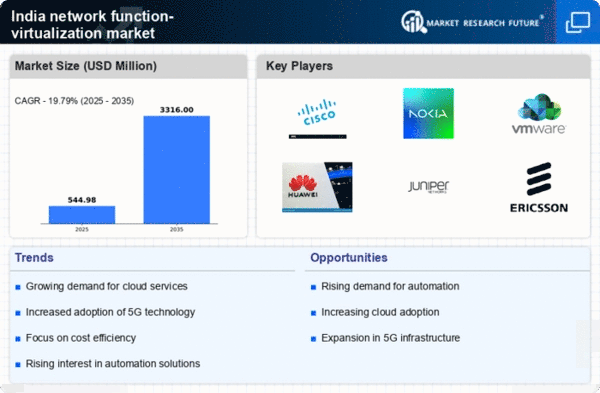Rising Mobile Data Consumption
India's mobile data consumption has been on a rapid rise, driven by the proliferation of smartphones and affordable data plans. This trend is significantly influencing the network function-virtualization market, as telecom operators seek to enhance their network capabilities to accommodate the growing demand for data services. With mobile data traffic projected to increase by over 50% in the coming years, service providers are compelled to adopt virtualization technologies to optimize their networks. By leveraging network function virtualization, operators can efficiently manage resources and improve service delivery, thereby addressing the challenges posed by escalating data consumption. This dynamic is likely to propel the growth of the network function-virtualization market in India.
Shift Towards 5G Implementation
The impending rollout of 5G technology in India is poised to revolutionize the telecommunications landscape, thereby impacting the network function-virtualization market. 5G networks require advanced infrastructure capable of supporting high-speed data transmission and low latency. Network function virtualization plays a crucial role in enabling this transition, as it allows for the flexible deployment of network services and applications. As telecom operators prepare for 5G implementation, they are increasingly investing in virtualization solutions to enhance their network agility and scalability. This shift is expected to drive substantial growth in the network function-virtualization market, as service providers seek to leverage the benefits of 5G technology.
Growing Demand for Cost Efficiency
The network function-virtualization market in India is experiencing a notable surge in demand for cost efficiency among enterprises. Organizations are increasingly seeking to reduce operational expenses while maintaining high service quality. By adopting network function virtualization, companies can significantly lower their capital expenditures, as they no longer need to invest heavily in physical hardware. This shift is particularly relevant in the Indian context, where businesses are under pressure to optimize costs. According to recent estimates, the adoption of virtualization technologies can lead to a reduction in operational costs by up to 30%. This trend indicates a strong inclination towards solutions that enhance financial performance, thereby driving growth in the network function-virtualization market.
Increased Focus on Network Resilience
In the face of evolving cyber threats and the need for uninterrupted services, there is a growing emphasis on network resilience within the Indian telecommunications sector. The network function-virtualization market is benefiting from this trend, as virtualization technologies offer enhanced flexibility and redundancy. By virtualizing network functions, organizations can quickly adapt to changing conditions and recover from disruptions more effectively. This focus on resilience is particularly pertinent in India, where businesses are increasingly aware of the potential risks associated with network failures. As a result, investments in network function virtualization are likely to rise, driven by the need for robust and reliable network infrastructures.
Regulatory Support for Digital Transformation
The Indian government has been actively promoting digital transformation initiatives, which is positively impacting the network function-virtualization market. Policies aimed at enhancing digital infrastructure and encouraging the adoption of advanced technologies are creating a conducive environment for virtualization solutions. The National Digital Communications Policy, for instance, aims to increase broadband penetration and improve connectivity across the country. This regulatory support is likely to facilitate the deployment of network function virtualization, as it aligns with the government's vision of a digitally empowered society. As a result, the network function-virtualization market is expected to benefit from increased investments and initiatives that foster technological advancements.
















